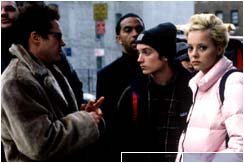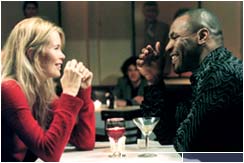

So you walk into a movie theater, and the first thing on the screen is a threesome. Either you stepped into the wrong theater, or James Toback's (Two Guys and a Girl, Bugsy) Black and White is beginning. The threesome is Toback's way of setting the tone for the rest of the story. Toback wants to grab the attention of the viewer in an audacious way. Black and White purports to examine the influence of black culture and hip-hop on white teenagers. It partially succeeds, mostly because any actual analysis is lost in the myriad stories and stunt casting. The movie is provocative, mainly for its own sake.
The main story revolves around Sam Donager (Brooke Shields, The Bachelor, NBC's Suddenly Susan) and her gay husband Terry (Robert Downey Jr., Wonder Boys, Two Guys and a Girl), and their efforts to make a documentary on the influence of hip-hop on white teenagers. They shadow a group of teens that include Charlie (Bijou Phillips), Wren (Elijah Wood, The Faculty, Deep Impact), and Marty (Eddie Kaye Thomas, American Pie, UPN's Brutally Normal). Marty's brother Will (William Lee Scott, Gone in 60 Seconds, Gattaca) hangs out with Rich Bower (Power of the Wu-Tang Clan), a reforming hoodlum and aspiring rap artist. Unknown to Wren, Charlie also hangs out with Rich. Dean (New York Knick Allan Houston) is a star basketball player in college, and old friend of Bower. Dean's girlfriend Greta (Claudia Schiffer) is also Rich's ex-girlfriend. A gambler (Ben Stiller, Mystery Men, Zero Effect) is trying to get Dean to throw a game. There is also another plot about a new club run by whites opening up on a black neighborhood, and Bower's efforts to record an album, but they are all underdeveloped, and relatively uninteresting.
Toback cast Mike Tyson, Marla Maples, and others in roles that are pretty much worthless. Tyson really serves no purpose in the film other than to look menacing. The only worthwhile portions are with Shields and Phillips. Phillips and her friends confide their reasons for emulating blacks. They are trying to rebel and piss off their parents. They are trying to find what they like, and succumbing to peer pressure. Charlie says that in a few years, she could be completely over her fascination. What starts off as interesting slowly turns into the conventional as the movie progresses and some of the stories begin to converge. Black and White loses its force here, replacing cutting edge commentary with typical movie melodrama. Toback does deserve credit for trying to introduce his ideas. He tries to reverse traditional roles of power and authority. Everyone here uses everyone else for their own selfish reasons. There are definite hip-hop credentials though. The Wu-Tang Clan (oddly enough, they are blacks infatuated with Asian ideals) provide much of the music, with acting assists from Power, Raekwon, Inspectah Deck, and Method Man. Not that great of a statement when the music is better than the movie.